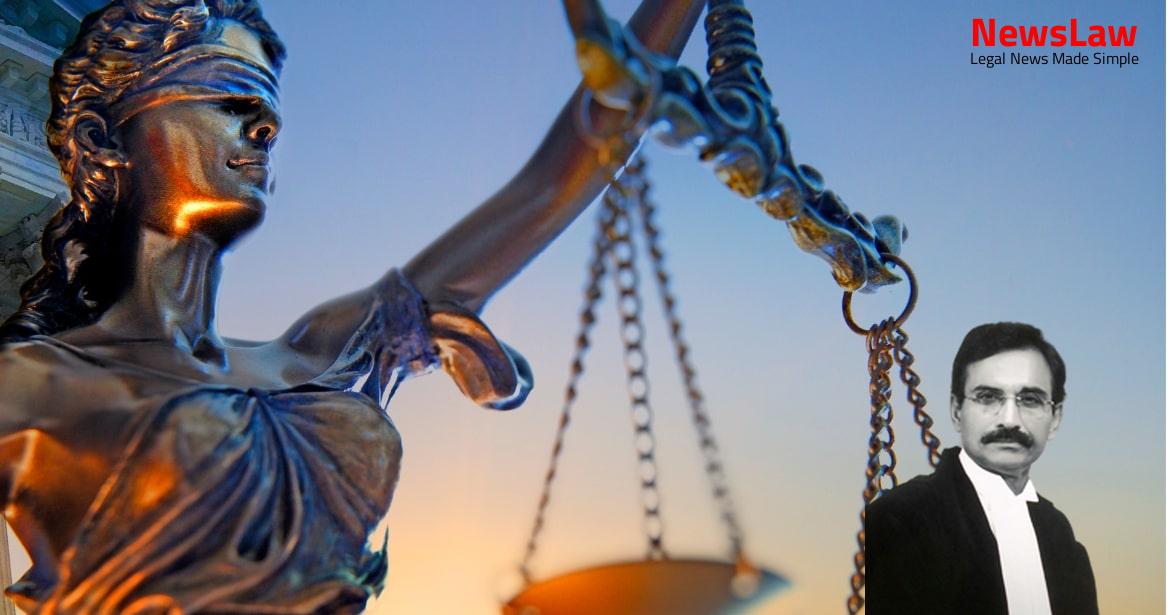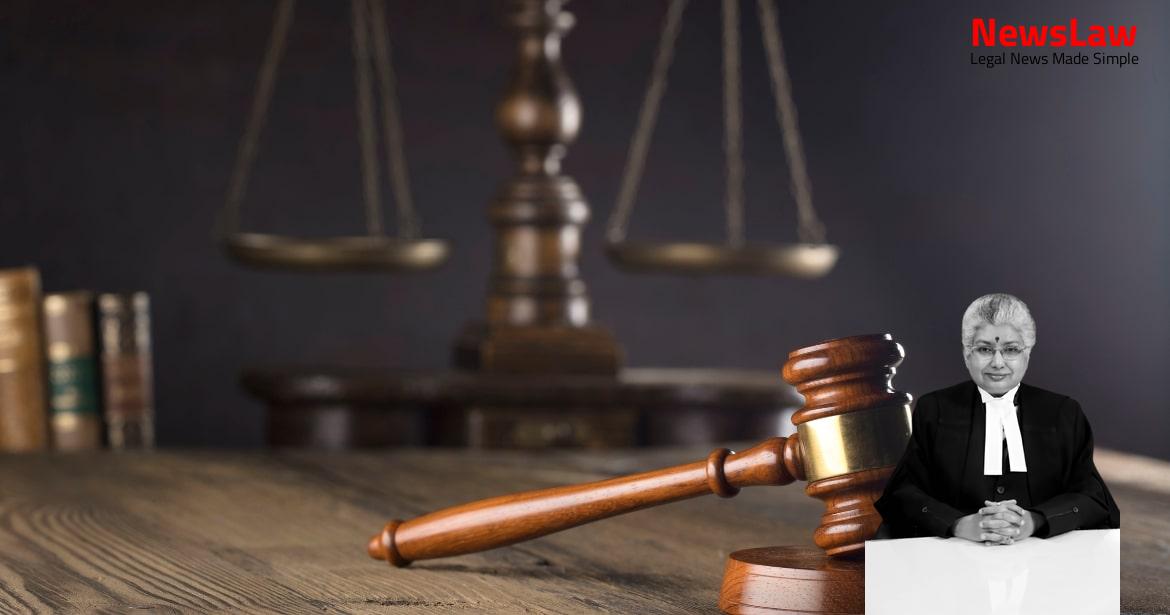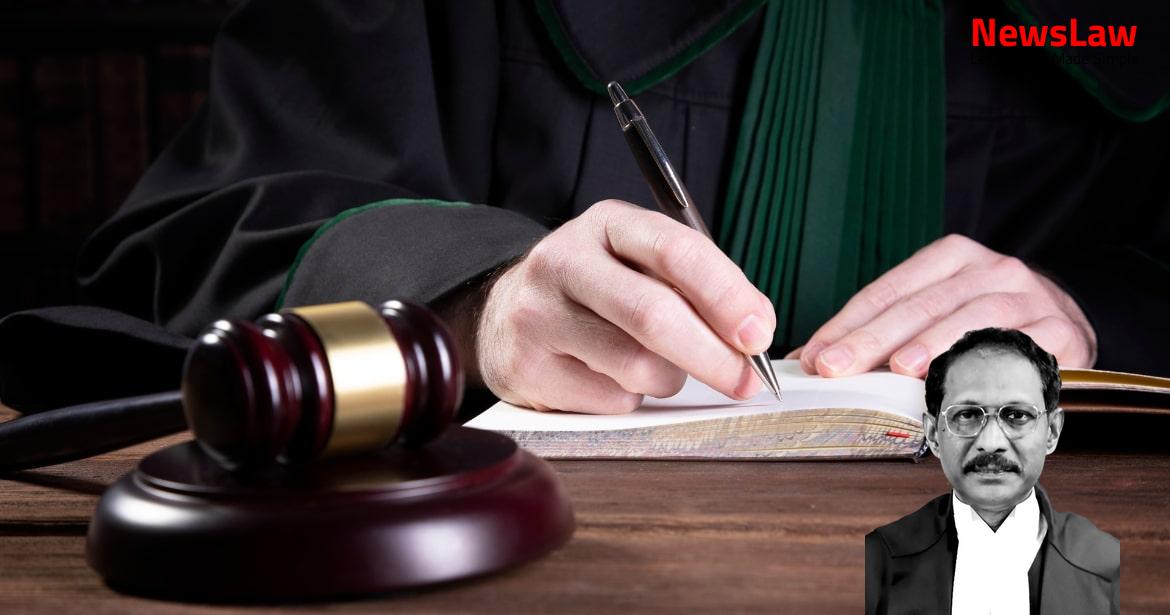Delve into the intricate legal analysis provided by the court regarding the impact of changes in law on arbitration awards. The court’s detailed examination of contract terms, parties’ intentions, and the grounds for upholding or setting aside arbitral awards provides valuable insights into the complexities of commercial agreements and dispute resolution. Stay tuned to uncover the legal intricacies of this significant case.
Facts
- TPT filed an appeal before the Madras High Court challenging the award of the Arbitral Tribunal and the order passed by the District Court.
- The Madras High Court allowed the appeal of respondent No.1 under Section 37(1)(c) of the Arbitration and Conciliation Act, setting aside the award and the District Judge’s order.
- The case involved a global tender issued by TPT for development of Seventh Berth at V.O. Chidambranar Port on BOT basis.
- SICAL submitted its bid in response to the tender.
- Arbitral Tribunal passed an award in favor of SICAL based on a change in law.
- Various orders were passed by the Madras High Court and the District Judge in the course of the proceedings.
- The District Judge granted an ad-interim stay in a Section 9 petition filed by SICAL.
- The Madras High Court held that the petition filed by TPT under Section 34 of the Arbitration Act was not tenable due to jurisdictional issues.
- SICAL’s proposal for increase in tariff was rejected by TAMP on multiple occasions.
- Various communications and directives were issued by GoI and TPT in response to SICAL’s proposals.
- SICAL filed writ petitions challenging the decisions of TAMP and GoI.
- Arbitration proceedings were initiated by SICAL invoking the arbitration clause in the License Agreement.
- Multiple orders were passed by the Madras High Court directing reconsideration of SICAL’s proposals and decisions.
- TPT also filed petitions challenging the arbitral award.
- Different orders and guidelines were issued by TAMP regarding tariff fixation and revenue sharing models.
- Overall, there were ongoing disputes and legal actions between SICAL, TPT, TAMP, and other authorities regarding tariff, royalty, and the License Agreement.
- The Expert Committee was involved in reviewing the proposals submitted by SICAL and TPT.
Also Read: Presumption of Genuine Endorsements in Cheque Case
Arguments
- Dr. Singhvi argues that the proceedings before the High Court are related to the period before 2013, while the current proceedings are about relief under Article 14 of the agreement due to a change in law.
- SICAL approached the arbitrator in 2011-12 as the royalty payable to TPT exceeded the tariff.
- Dr. Singhvi points out the difference in binding decisions under Articles 10.8, 13.4.7, and 13.4.8 compared to the non-binding nature of Article 14 in the agreement.
- The writ petitions by SICAL were primarily against TAMP regarding tariff fixation.
- Dr. Singhvi criticizes the High Court for referencing the writ petitions and MoC while setting aside the award, stating that interference should only occur if the arbitrator’s decision is perverse.
- TPT opposed any tariff reduction when SICAL proposed an increase in 1999, demonstrating an understanding that royalty played a role in tariff finalization.
- Various guidelines and orders indicate the treatment of royalty as a pass-through under TAMP policies.
- Dr. Singhvi refers to the first change in law in 2003 and subsequent events leading to SICAL’s need to request agreement amendments under Article 14.
- The appellant argues that the High Court’s interference with the Arbitral Tribunal’s findings was unwarranted, relying on previous judgments for support.
- The UNIDROIT Principles of International Commercial Contracts are cited for contract interpretation rules by Dr. Singhvi.
- SICAL’s precarious situation and the unique aspects of Article 14 in the License Agreement are highlighted.
- Smt. Divan counters by claiming SICAL engaged in inconsistent behavior by seeking relief through writ petitions and arbitration for the same matter.
- She argues against the Tribunal’s substitution of contract terms and for maintaining the original agreement based on royalty method chosen by SICAL.
- The discussion also involves changes in law affecting royalty pass-through and SICAL’s financial obligations to TPT.
- Key points address the intention behind Article 14 and how the conduct of parties and legal procedures impacted the case.
- Dr. Singhvi emphasizes the parties’ intent for relief in case of detrimental law changes and challenges the High Court’s approach to the case.
- Dr. Singhvi argued that the argument on the doctrine of election is unsubstantiated.
- SICAL had been requesting relief under Article 14 since 2006, not just in 2013 as claimed by Smt. Divan.
- SICAL’s statement that guidelines do not have the force of law is deemed irrelevant by Dr. Singhvi.
- The agreement between SICAL and TPT was entered into in July 1998, after the guidelines came into effect in February 1998.
- TPT and TAMP themselves admitted that the guidelines would have the force of law.
- Proceedings in the High Court were solely focused on TAMP orders and not on a change in law.
- SICAL was legally entitled to invoke Article 14 due to adverse effects from the change in law.
- Proposals from TPT indicated agreement to a revenue share model post a meeting with the Secretary of Ministry of Shipping and Transport, GoI.
- Dr. Singhvi argued that the case laws cited by Smt. Divan were not relevant to the present case as they did not involve a clause akin to Article 14.
Also Read: Medical Negligence and Compensation: A Landmark Decision
Analysis
- The liability accounts for about 11.4%, 15.4%, and 19.2% of the operating income estimated for the years 2002, 2003, and 2004 based on existing tariffs.
- The Port does not have the right to interfere with the tariff-fixing power of TAMP, which is their exclusive domain and jurisdiction.
- The contract was not entered into based on any guidelines, and charges will be collected from cargo interests, owners, or agents of vessels.
- An assured rate of return can be achieved by rationalizing the tariff structure, reducing service costs, or eliminating unproductive assets.
- TAMP must adhere to established costing systems and pricing principles, aiming for competitive pricing until more information is available.
- Guidelines of February 1998 do not factor royalty as a cost in tariff fixation.
- TAMP allowed the existing tariffs based on CHPT rates, without addressing royalty issues.
- The Arbitral Tribunal’s decision to substitute the ‘royalty payment method’ with the ‘revenue-sharing method’ was done unilaterally, against TPT’s wishes.
- Court not expected to act as an appellate court in Section 34 applications; should not reappreciate evidence.
- All petitions remanded to TAMP and GoI for further consideration and clarification.
- SICAL opposing TAMP orders for tariff fixation due to financial losses incurred; grounds for interference in arbitral awards limited.
- Arbitral Tribunal’s decision seen as having no evidence and ignorance of vital evidence, leading to a patent illegality.
- Various guidelines and notifications from TAMP and GoI challenge SICAL’s claims and lead to legal disputes.
- Contractual disputes centered around changes in law, royalty payments, and tariff fixation issues.
- Differences between parties regarding contract terms, financial negotiations, and compliance with guidelines under scrutiny.
- The role of the arbitrator is to arbitrate within the terms of the contract.
- An award may not be interfered with if the view taken by the arbitrator is a possible view based on facts.
- A finding based on no evidence at all or an award which ignores vital evidence in arriving at its decision would be considered as perverse and liable to be set aside on the ground of patent illegality.
- The scope of interference with an arbitral award is limited to grounds provided under Section 34 of the Arbitration Act.
- Public policy of India is now constricted to mean a violation of the fundamental policy of Indian law and a violation of basic notions of justice or morality.
- Explanation 2 to Section 34(2)(b)(ii) adds conditions for setting aside an award based on patent illegality appearing on the face of the award.
- The proviso states that an award shall not be set aside merely on the ground of an erroneous application of the law or by reappreciation of evidence.
- Re-writing a contract for parties would breach fundamental principles of justice.
- The scope of interference is limited to grounds provided under Section 34 of the Arbitration Act, primarily focused on violation of the public policy of India.
- Change in Law is defined as any amendment, alteration, modification or repeal of existing law by Government Authority or through court interpretation or enactment of new law after the date of the Agreement.
- Law refers to any valid act, ordinance, rule, regulation, notification, directive, order, policy, bylaw, administrative guideline, ruling, or instruction by a Government Authority.
- Relief under Change in Law is provided for in the Agreement to address the impact of any such changes on the parties involved.
- Making any observation on the merits of the issue may prejudice the rights of the parties.
- The High Court’s observations on other aspects of the matter, except the validity of the Award, will not hinder either party from raising grievances in pending or future proceedings.
- No observations will be made on the arguments heavily contested before the court.
Also Read: Remand of Writ Petition for Restoration and Decision on Merits
Decision
- The issue at hand is the validity of the Award.
- The appeals have been dismissed with the given observations.
- Any pending applications will be disposed of accordingly.
- No costs will be awarded in this case.
Case Title: PSA SICAL TERMINALS PVT. LTD. Vs. THE BOARD OF TRUSTEES OF V.O. CHIDAMBRANAR PORT TRUST TUTICORIN (2021 INSC 365)
Case Number: C.A. No.-003699-003700 / 2018



